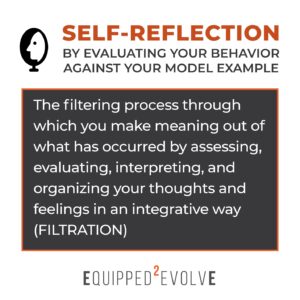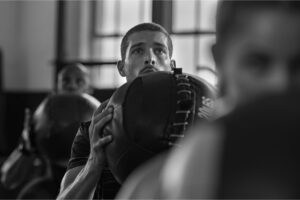Labels are an integral tool of linguistics and communication because of how they help us to identify, categorize, organize, and describe objects, surroundings, and experiences.
However, labels that unconsciously get applied to ourselves or others’ identities can undermine our learning potential and psychological flexibility. The reason being is that identity labels tend to represent a story that evaluates our competency, virtuousness, and loveableness.
- Competency: Am I competent?
- Virtuousness: Am I a good person?
- Loveableness: Am I worthy of love?
When we feel that the story we tell ourselves about who we are is threatened, our biology gets triggered. We respond out of fear with an instinct to fight, flee, submit, and/or freeze in order to survive. Unfortunately, when our brains are preoccupied with survival, they are incapable of expending energy in order to learn, perform, and adapt.

Therefore, it is critical to practice observing whether our tendency is to view our experiences as labelers of who we are or teachers of who we can become.
Carol Dweck’s research on mindset began with observing a distinction between kids that became frustrated, irritated, and disinterested in completing puzzles that progressively got harder in contrast to other kids that became more engaged, energized, and interested as the puzzles grew in difficulty.
Dweck classified the first group of kids as being fixed minded and the second group of kids as being growth minded. For the fixed minded kids, they became discouraged because they viewed the puzzle difficulty as a permanent evaluation of their skillset; whereas, for the growth minded kids, they became more encouraged because they viewed the puzzle difficulty as an opportunity to learn and grow.
With more awareness over how we make meaning of our experiences, we can choose to prioritize learning over labeling. Said differently, allow an experience to teach you rather than judge you (p. 197).
Labels are often a gross simplification that reveal that which we are afraid of being true. This is why when we are faced with threats, we resist them, over-identify with them, and/or over compensate. It is common to hear people say “I am awful with technology” when they are confronted with a technical difficulty. Similarly, Dweck in Mindset writes about someone’s tendency to knock over a bucket of nails and attribute it to them being clumsy.
Instead of labeling yourself as clumsy, ask yourself: What does this reoccurring pattern of knocking things over teach you about your habits of attention and situational awareness?
The real challenge with adversity is not the degree of difficulty of what it is you are facing, but the meaning you make about who you are as you face it. Are you labeling yourself or teaching yourself?




